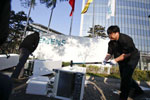Keep the lid on inflation
Updated: 2011-11-10 07:54
(China Daily)
|
|||||||||||
That China's inflation rate has slowed for three straight months after peaking at a 37-month high of 6.5 percent in July is solid evidence that there is a desired modest slowdown in the world's second-biggest economy.
Undoubtedly, Chinese policymakers can breathe more easily for the moment as their hard fight against inflation is now beginning to bear fruit.
Though the country's consumer price index (CPI) rose 5.5 percent year-on-year in October, still far above the government's full-year target of 4 percent, inflation worries have ostensibly eased amid increasing optimistic forecasts of even lower price gains in coming months.
The ongoing fall in the CPI is, of course, no guarantee of a definite victory in the war against inflation.
For instance, as Premier Wen Jiabao recently warned, the coming winter will be the peak period for consumer demand but also the slack season for vegetable production in the country's north.
However, thanks to all the tightening measures to tame inflation, China's economic growth has fallen for three straight quarters and is even expected to slow to less than 9 percent next year for the first time in a decade.
If the pace of economic growth continues to slow, it is reasonable to believe that the Chinese government will sooner or later be able to bring inflation under firm control in the absence of any external shocks.
Yet, it is one thing to show more confidence in the uphill struggle against accelerating inflation, it is quite another to lower our guard against inflationary pressures too early.
Citing the difficulties of a large number of small businesses, especially in the export sector, some people have called for credit easing to cushion this sector of the economy, which supports 75 percent of China's jobs.
More loans and higher economic growth may indeed help some small enterprises. But runaway inflation that drastically drives up wages and the prices of raw materials pose a much bigger threat to the very survival of the majority of such enterprises.
Hence, when extending a helping hand to small enterprises, Chinese policymakers must weigh carefully the implication of any attempt to quickly change course during the fight against inflation.
Another reason for Chinese policymakers to still make taming inflation a top priority is that economic growth must be as inclusive as possible.
Food-led inflation is always one of the main culprits for the widening income disparity in the country, as it hits the poor hardest. The October 11.9-percent surge in food prices - which account for nearly one-third of the CPI - shows that the need to arrest consumer inflation, particularly for the interest of the poor, remains imperative.
(China Daily 11/10/2011 page8)




